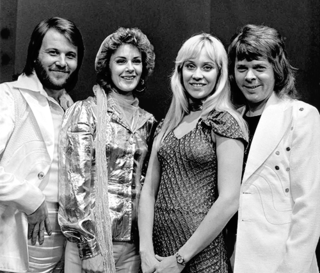
ABBA were a Swedish pop supergroup formed in Stockholm in 1972 by Agnetha Fältskog, Björn Ulvaeus, Benny Andersson, and Anni-Frid Lyngstad. The group's name is an acronym of the first letters of their first names arranged as a palindrome. They are one of the most popular and successful musical groups of all time, and are one of the best-selling music acts in the history of popular music, topping the charts worldwide from 1974 to 1982, and again in 2021 following their reunion.
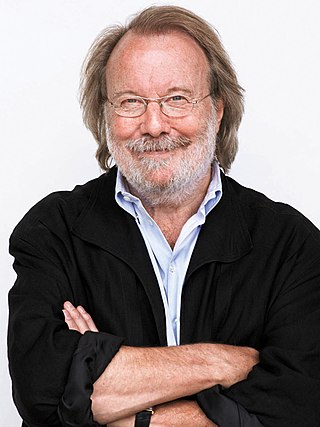
Göran BrorBennyAndersson is a Swedish musician, composer and producer best known as a member of the pop group ABBA and co-composer of the musicals Chess, Kristina från Duvemåla, and Mamma Mia! For the 2008 film version of Mamma Mia! and its 2018 sequel, Mamma Mia! Here We Go Again, he worked also as an executive producer. Since 2001, he has been active with his own band Benny Anderssons orkester.

Anni-Frid Synni Lyngstad, also known simply as Frida, is a Norwegian-born Swedish singer who is best known as one of the founding members and lead singers of the pop band ABBA. Courtesy titles Princess Reuss and Countess of Plauen are also in use due to her third marriage. Born in Bjørkåsen (Ballangen), Norway, to a Norwegian mother and a German father, she grew up in Torshälla, Sweden, and started her first solo career there, as a jazz singer in 1967, through a talent competition called New Faces.
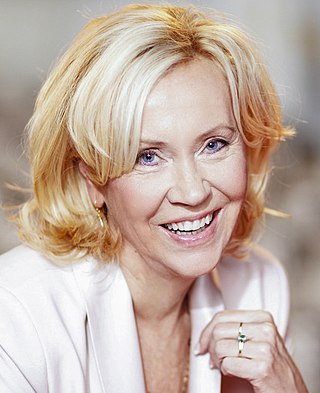
Agneta Åse Fältskog, known as Agnetha Fältskog and AnnaFältskog, is a Swedish singer, songwriter and a member of the pop group ABBA. She first achieved success in Sweden with the release of her 1968 self-titled debut album. She rose to international stardom in the 1970s as a member of ABBA, which is one of the best-selling music acts in history. She is the youngest member of ABBA, and the only one born in the 1950s.

Arrival is the fourth studio album by the Swedish pop group ABBA. It was originally released in Sweden on 11 October 1976 by Polar Records. It became one of ABBA's most successful albums to date, producing three of their biggest hits: "Dancing Queen", "Money, Money, Money" and "Knowing Me, Knowing You". The track "Fernando", which had been recently released as a single in March 1976, was included on the Australian and New Zealand versions of the album. Arrival was the best-selling album of 1977 in the United Kingdom and was certified gold by the Recording Industry Association of America.
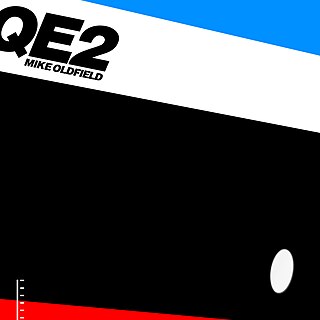
QE2 is the sixth studio album by Mike Oldfield, released in 1980 on Virgin Records. The album was named after the ocean liner Queen Elizabeth 2.

Daniel Xavier-Marie Balavoine was a French singer and songwriter. He was hugely popular in the French-speaking world in the early 1980s; he inspired many singers of his generation such as Jean-Jacques Goldman, Michel Berger, who was his closest friend, as well as the Japanese pop-rock group Crystal King. Balavoine was a part of the original cast of the rock opera Starmania in 1978, which was written by Berger.
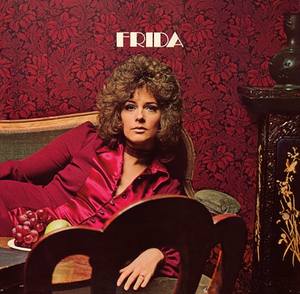
Frida is the debut studio album by Swedish singer Anni-Frid Lyngstad, released in March 1971 by EMI Columbia. Recorded between September 1970 and January 1971, Frida was produced by her then-fiancé, Benny Andersson. Frida was her only album recorded for EMI during her contract, not counting her eponymous compilation album from 1972, before being signed to Polar and form with the Swedish pop group ABBA, a year later.

Frida ensam is the second studio album by Swedish singer Anni-Frid Lyngstad. It was first released by Polar Music in 1975 while Lyngstad was a member of the pop group ABBA and produced by her then-fiancé and fellow ABBA member, Benny Andersson. It has since been re-released several times, most significantly in remastered form in 2005 with bonus tracks. The lead song was the original version of "Fernando" sung in Swedish by Lyngstad. The album was a huge success in Sweden and Lyngstad was awarded a platinum disc. The album is included in the box set, Frida – 4xCD 1xDVD.
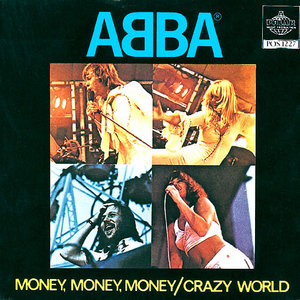
"Money, Money, Money" is a song recorded by Swedish pop group ABBA, written by Benny Andersson and Björn Ulvaeus with Anni-Frid Lyngstad singing lead vocals. It was released on 1 November 1976, as the second single from their fourth album, Arrival (1976). The B-side, "Crazy World", was recorded in 1974 during the sessions for the album ABBA. The song is sung from the viewpoint of a woman who, despite hard work, can barely keep her finances in surplus, and therefore desires a well-off man.

Shine is the fourth studio album by Swedish singer Anni-Frid Lyngstad, and her second international solo album as Frida. It was first released in September 1984 and has since been re-released several times, mainly in the digitally remastered form in 2005 with bonus tracks. Shine, alongside the accompanying promotional videos and clips, is included in Frida – 4xCD 1xDVD. This album has never been officially released in the United States, but was issued in Canada by WEA. This is Lyngstad's last solo English language studio album to date.
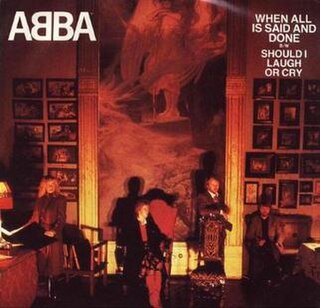
"When All Is Said and Done" is a song recorded in 1981 by Swedish pop group ABBA, and is featured on the group's eighth studio album, The Visitors. The track – with lead vocals by Anni-Frid Lyngstad – was released as a single in the United States on 31 December 1981 on Atlantic 3889, and reached No. 27 on the US Billboard Hot 100 in March 1982.
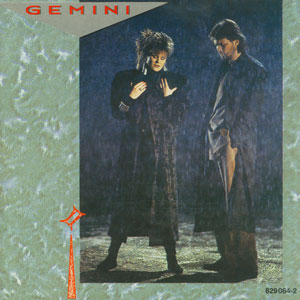
Gemini is an album by Gemini released in 1985. Produced by Benny Andersson, Björn Ulvaeus and Anders Glenmark, the album features songwriting contributions from Andersson, Ulvaeus, Glenmark and Ingela Forsman. The album peaked at No. 9 on Sverigetopplistan in November 1985.
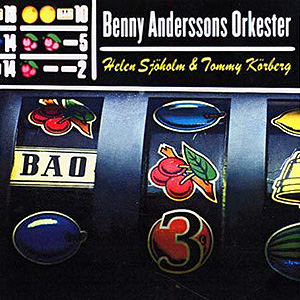
BAO 3 is a studio album by Swedish folk group Benny Anderssons Orkester, released on 24 October 2007. It is the group's third studio album and their fourth release in total.

ABBAcadabra is a French children's musical based on songs from the pop group ABBA. It was originally produced for French television in 1983 by Alain and Daniel Boublil, but which was later also transferred to an English stage version and two other television programs. The story was not always the same as the selection of the chosen songs varied by productions.
The Seeker is a song written by ABBA composers Björn Ulvaeus and Benny Andersson towards the end of the group's career. The song was however not recorded by ABBA, but was 'given' by the composers to be included in the 1983 London staging of the originally French musical "Abbacadabra", based on 14 of the group's songs. The lyrics were altered for the show by Don Black and Mike Batt.
"My Love, My Life" is a song recorded by ABBA for their album, Arrival. The song was written by Benny Andersson and Björn Ulvaeus.
"Like an Angel Passing Through My Room" is the closing track on ABBA's 1981 album The Visitors. It was written by Benny Andersson and Björn Ulvaeus.

Catherine Ferry is a French singer. In 1976, at the Eurovision Song Contest, Catherine Ferry represented France with the song "Un, deux, trois". She ranked second in the contest. Among the backing vocalists was Daniel Balavoine, who wrote the B side "Petit Jean". She worked and was produced mainly by Daniel Balavoine a famous French singer who wrote nearly 30 songs for her.
















